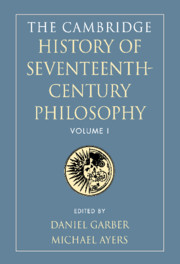Book contents
- Frontmatter
- Introduction
- I The context of seventeenth-century philosophy
- II Logic, language, and abstract objects
- III God
- IV Body and the physical world
- 15 The scholastic background
- 16 The occultist tradition and its critics
- 17 Doctrines of explanation in late scholasticism and in the mechanical philosophy
- 18 New doctrines of body and its powers, place, and space
- 19 Knowledge of the existence of body
- 20 New doctrines of motion
- 21 Laws of nature
- 22 The mathematical realm of nature
- V Spirit
- Bibliographical appendix
- Bibliography
- References
16 - The occultist tradition and its critics
from IV - Body and the physical world
Published online by Cambridge University Press: 28 March 2008
- Frontmatter
- Introduction
- I The context of seventeenth-century philosophy
- II Logic, language, and abstract objects
- III God
- IV Body and the physical world
- 15 The scholastic background
- 16 The occultist tradition and its critics
- 17 Doctrines of explanation in late scholasticism and in the mechanical philosophy
- 18 New doctrines of body and its powers, place, and space
- 19 Knowledge of the existence of body
- 20 New doctrines of motion
- 21 Laws of nature
- 22 The mathematical realm of nature
- V Spirit
- Bibliographical appendix
- Bibliography
- References
Summary
THE SOURCES AND STATUS OF THE OCCULT PHILOSOPHY IN THE EARLY SEVENTEENTH CENTURY
One of the first members of Rome's Accademia dei Lincei, established in 1603 to advance the understanding of natural philosophy, was Giambattista Della Porta, Galileo's colleague in the renowned Roman society and his rival in the development of the telescope. Four decades before, Della Porta had founded his own Accademia dei Secreti della Natura, only to see it fail when the Inquisition called him up on charges of sorcery. He died in 1615, 1ong after publishing his Magia naturalis libri IV in Naples in 1558; a much enlarged edition followed in 1589, commanding enough interest through the seventeenth century to support many Latin and vernacular printings. Readers of the English version (London, 1658) learned in the first chapter that ‘Magick is taken amongst all men for Wisdom, and the perfect knowledge of natural things: and those are called Magicians, whom… the Greeks call Philosophers’. This overture to a treatise on magic was commonplace in its own time and had been familiar since antiquity, but when Della Porta called magicians philosophers, he struck a note that jars modern ears.
‘There are two sorts of Magick’, he explained; ‘the one is infamous… because it hath to do with soul spirits and… Inchantments… and this is called Sorcery…. The other Magick is natural…. The most noble Philosophers… call this knowledge the very… perfection of natural Sciences’. In other words, the good natural magic that Della Porta traced to Pythagoras, Plato, Aristotle, andother philosophical worthies was not the evil demonic magic that ‘all learned and good men detest’.
- Type
- Chapter
- Information
- The Cambridge History of Seventeenth-Century Philosophy , pp. 454 - 512Publisher: Cambridge University PressPrint publication year: 2000
References
- 4
- Cited by



